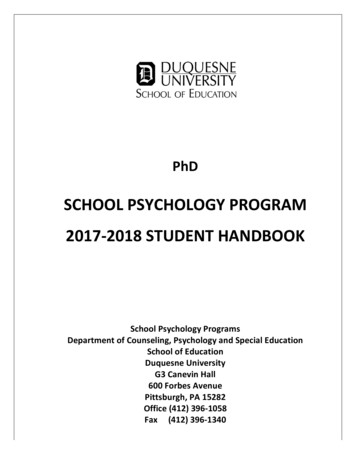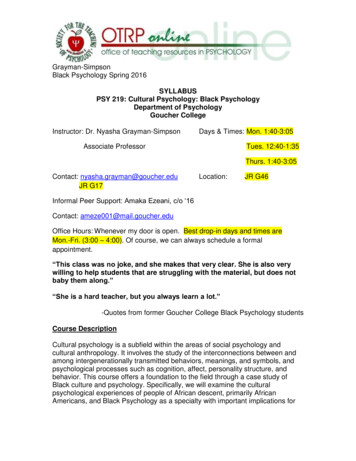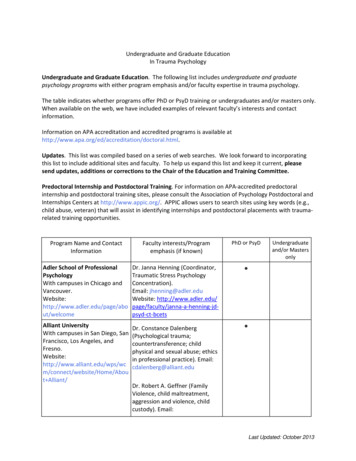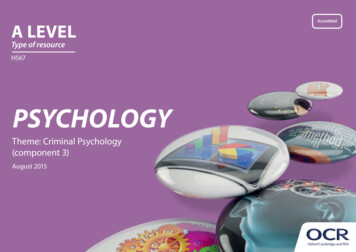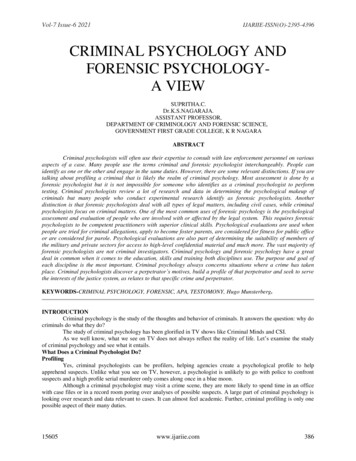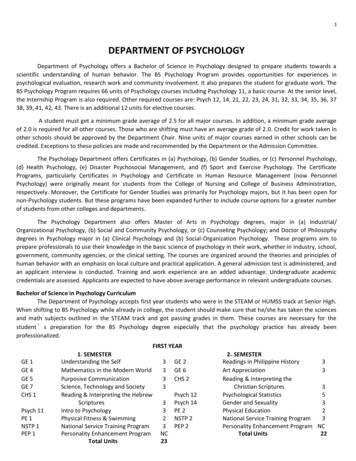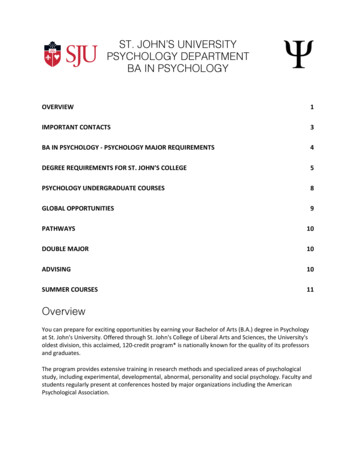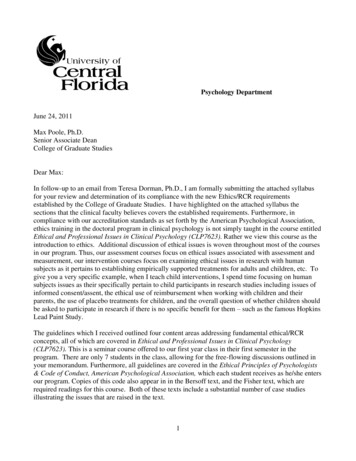
Transcription
Psychology DepartmentJune 24, 2011Max Poole, Ph.D.Senior Associate DeanCollege of Graduate StudiesDear Max:In follow-up to an email from Teresa Dorman, Ph.D., I am formally submitting the attached syllabusfor your review and determination of its compliance with the new Ethics/RCR requirementsestablished by the College of Graduate Studies. I have highlighted on the attached syllabus thesections that the clinical faculty believes covers the established requirements. Furthermore, incompliance with our accreditation standards as set forth by the American Psychological Association,ethics training in the doctoral program in clinical psychology is not simply taught in the course entitledEthical and Professional Issues in Clinical Psychology (CLP7623). Rather we view this course as theintroduction to ethics. Additional discussion of ethical issues is woven throughout most of the coursesin our program. Thus, our assessment courses focus on ethical issues associated with assessment andmeasurement, our intervention courses focus on examining ethical issues in research with humansubjects as it pertains to establishing empirically supported treatments for adults and children, etc. Togive you a very specific example, when I teach child interventions, I spend time focusing on humansubjects issues as their specifically pertain to child participants in research studies including issues ofinformed consent/assent, the ethical use of reimbursement when working with children and theirparents, the use of placebo treatments for children, and the overall question of whether children shouldbe asked to participate in research if there is no specific benefit for them – such as the famous HopkinsLead Paint Study.The guidelines which I received outlined four content areas addressing fundamental ethical/RCRconcepts, all of which are covered in Ethical and Professional Issues in Clinical Psychology(CLP7623). This is a seminar course offered to our first year class in their first semester in theprogram. There are only 7 students in the class, allowing for the free-flowing discussions outlined inyour memorandum. Furthermore, all guidelines are covered in the Ethical Principles of Psychologists& Code of Conduct, American Psychological Association, which each student receives as he/she entersour program. Copies of this code also appear in in the Bersoff text, and the Fisher text, which arerequired readings for this course. Both of these texts include a substantial number of case studiesillustrating the issues that are raised in the text.1
Below I will address the additional readings that address each of the four issues that you list and willuse a different color highlighter to illustrate on the attached syllabus where that content is discussed.I. Avoiding plagiarism, including a discussion of self-plagiarism.We have an entire section of our course on research ethics. This particular topic is in green fonton page 7. We will use the latest version of the Office of Research Integrity syllabus found on thewebsite.II. Attributing Authorship.The Office of Research Integrity syllabus highlighted in bright green above also addresses thisissue as does the APA Ethical Code. Furthermore, specific readings are highlighted in purple text (p.7)III. Integrity in Data Collection.Readings on the fabrication of data or falsification of data are in red text (p.7-8)IV. Personal integrity in an academic setting.Recognizing conflicts of interest, respectful and professional behavior when interacting withothers. The articles in blue address these issues (p.7). We do not have any specific readings onintegrity in face-to-face and on-line examinations but it is certainly discussed.As you know, all of our courses are reviewed as part of our continuing accreditation by the AmericanPsychological Association. Furthermore, because all of our research is with Human Subjects, allstudents are required to complete CITI training immediately upon their matriculation in August,providing further required training in research ethics with human subjects.On behalf of the clinical faculty, we thank you for your efforts to educate all graduate students on theimportance of research ethics. We have been engaged in that training for the past 10 years in thisprogram and for some of us, more than 20 years. We hope that you agree that our established coursemeets the guidelines of the required topics, but if you have any suggestions for additional readings,please let us know.Sincerely yours,Deborah C. Beidel, Ph.D., ABPPDirector, UCF Anxiety Disorders ClinicProfessor and Director of Clinical TrainingDepartment of Psychology2
Psychology PSY CLP 7623, Section 0001:Ethical and Professional Issues in Clinical Psychology (3 credits)Instructor: Michael E. Dunn, Ph.D.Term:Fall, 2011Office: Psychology (PSY) 343Meeting Time: Wed., 9:30- 12:20Phone: 407-341-7869Building & Room: PSY 301QE-mail: mdunn@mail.ucf.eduOffice Hours: M & Th, 9-12, or by appt.Course Overview and Objectives:This course is a comprehensive introduction to ethical and professional issues for first year students inthe Clinical Psychology Ph.D. program at UCF. A myriad of issues and topics will be addressed,however, there are three primary goals:1) To sensitize students to the scope and complexity of ―professionalism‖ including awareness of therole that basic personal values and culture play in the formulation and implementation of professionalcodes of conduct;2) To acquaint students with the most recent version of the APA ethical principles & standards;3) To enable students to apply professional codes of conduct to guide their decision making andbehavior within all domains of their professional work, including clinical, research, and teachingactivities.I.TEXTS:1. REQUIRED: Bersoff, D.N. (2008). ETHICAL CONFLICTS IN PSYCHOLOGY [4thEd.].2. REQUIRED: Fisher, C. B. (2009).DECODING THE ETHICS CODE:APRACTICAL GUIDE TO PSYCHOLOGISTS (2nd Ed.).Other Material TBA.II.REQUIREMENTS FOR GRADE1. Attendance is required. Expected absences must be approved in advance by theinstructor. Unexpected absences that are clearly unavoidable must be reported as soon aspossible, in person or through text, voicemail, or e-mail messages. Any unexcused absencewill result in a failing grade for the course.2. Completion of Reading Assignments (both textbooks and the articles listed in Appendix A)i. Completing reading assignments and demonstrating appropriate familiaritywith the content through class participation is required, and will comprise10% of the course grade. At the discretion of the instructor, written summariesof the assigned reading may also be required.3. Performance on two written exams. 60% of Course Grade.4. Completion of Applied Examination in Resolving Ethical Dilemmas. 30% of CourseGradeIII.SCHEDULEWeek 1 & 2: Introduction, (Read: APA Code, Fisher 1-2; Bersoff 1-2; Newsweek article).Week 3 & 4: Ethical Decision Making(Fisher Chs. 3-4; Bersoff Ch. 3).Week 5 & 6: Confidentiality (Bersoff 4, Fisher 7)Week 7:Multiple Relationships (Bersoff 5, Fisher 6)Week 8:Exam 1 (Specifics will be provided in Week 6)Week 9:Psychological Assessment (Bersoff 6, Fisher 12)Week 10:Therapy, Competence (Bersoff Ch. 7, Fisher 5 & 13)Week 11 & 12:Academia: Research (Bersoff Ch 8 – except 2 readings noted below; Fisher3
Ch. 11; required readings listed in appendix A)Exam 2; Teaching, Supervision (Bersoff Ch. 8 Goodyear et al., Birch et al.;Fisher 10)SEE ATTACHED EXPANDED TABLE OF CONTENTS FOR SPECIFIC ITEMSCOVERED IN THESE TWO WEEKS OF CLASSESWeek 13:Week 14:Forensic Settings (Bersoff Ch. 9)Week 15:The Business of Psychology (Bersoff 10, Fisher 8, 9)Finals Week: Applied Examination in Resolving Ethical Dilemmas.REQUIRED READING ASSIGNMENTS NOTES:(In Addition to Chapter Assignments)Bibliography of Selected Ethical & Professional Issues Articles[AP American Psychologist; PP Professional Psychology: Research & Practice]A. GENERAL ETHICS Ethical Principles of Psychologists & Code of Conduct, APA, AP, 57, 1060-1073. [also in Bersoff Text,and Appendix in Fisher text;] An overview of the major changes in the 2002 APA Ethics Code, Knapp & VandeCreek. 2003, PP, 34,301-308. Fostering ethical willingness: Integrating emotional and contextual awareness with rational analysis.PP, 1999, 30(3), 295-301. Rights of clients, responsibilities of therapists, by R.T. Hare-Mustin, J. Marecek, A. Kaplan, & N.Liss-Levinson. AP, 1979, 34(1), 3-16. Ethics of practice: The beliefs and behaviors of psychologists as therapists. Pope, Tabachnick, &Keith-Spiegel, AP, 1987, 42(11), 993-1006. Ethics and the professional practice of psychologists: The role of virtues and principles. Jordan andMeara, PP, 1990, 21(2), 107-114. Clinical ethical decision-making: An investigation of the rationales used to justify doing less than onebelieves one should. Smith, McGuire, Abbott, & Blau, PP, 1991, 22(3), 235-239. Twenty-first century ethical challenges for psychology. Koocher, AP. 2007, 62(5), 375-384. Psychological science’s contributions to a sustainable environment. Kazdin, AP, 2009, 64(5), 339-356. From theory to practice: Facing ethical challenges as a clinical intern. Hambrick, Pimentel, Albano,Cognitive and Behavioral Practice. (2009), 16, 191-204. In the public eye: The ethical practice of media psychology. McGarrah, Martin, Alvord, Haldeman. PP(2009), 40, 172-180. Psychological ethics and national security. APA. European Psychologist, 2006, 11, 153-156. Reflecting on the common discourse on piracy and intellectual property rights: A divergent perspective.Yung. Journal of Business Ethics (2009) 87, 45–57. Report of the ethics committee, 2002 [AP, 2003, 58(8), 650-657] Report of the ethics committee, 2003 [AP, 2004, 59(5), 434-441] Report of the ethics committee, 2004 [AP, 2005, 60(5), 523-528] Report of the ethics committee, 2005 [AP, 2006, 61(5), 522-529] Report of the ethics committee, 2006 [AP, 2007, 62(5), 504-511] Report of the ethics committee, 2007 [AP, 2008, 63(5), 452-459] Report of the ethics committee, 2008 [AP, 2009, 64(5), 464-473]4
B. DIVERSITY ISSUES Guidelines on multicultural education, training, research, practice, and organizational change forpsychologists. APA, AP, May 2003, 377-402. Guess who’s coming to therapy? Getting comfortable with conversations about race and ethnicity inpsychotherapy. Cardemil & Battle. 2003, PP, 34, 278-286. Guidelines for psychological practice with older adults. APA, 2004, AP, 59, 236-260. Special Section: Culture and Ethnicity in Mental Health Service Delivery. 2004, PP, 35, 3-35.o Twelve practical suggestions for achieving multicultural competence. Stuarto Mental health services for native Americans in the 21st century United States. Goneo African Americans’ perceptions of psychotherapy and psychotherapists. Thompson, Bazile, &Akbaro The meaning of pain: A key to working with Spanish-speaking patients with work-relatedinjuries. Cervantes & Lechuga Dual agency for VA clinicians: Defining an evolving ethical question. Stone. Military Psychology ,(2008), 20, 37–48. Infusing Lesbigay research into the counseling research classroom. Erwin. Journal of Homosexuality,(2006) Vol. 51(3) Guidelines on multicultural education, training, research, practice, and organizational change forpsychologists, AP (2003) 58(5), 377–402. Ethical considerations when working with older adults in psychology. McGuire. Ethics &Behavior,(2009) 19(2),112 — 128. Ethical challenges and opportunities at the edge: Incorporating spirituality and religion intopsychotherapy. Gonsiorek, Richards, Pargament, & McMinn. PP (2009) 40(4), 385–395.Civilian psychologists in an Army culture: The ethical challenge of cultural competence. Reger,Etherage, Reger, Gahm. Military Psychology (2008), 20, 21-35.Navigating the dialectic: Following ethical rules versus culturally appropriate practice. Cole (2008) TheAmerican Journal of Family Therapy, 36, 425–436.Toward cultural competence in child intake assessments. Ecklund & Johnson. PP (2007). 38(4) 356–362.C. MANAGED CARE ISSUES Is three a crowd? Clients, clinicians, and managed care. Cohen, Marecek &Gillham. American Journal ofOrthopsychiatry (2006). 76(2), 251–259.The influence of payment method on psychologists diagnostic decisions regarding minimally impaired clients.Pomerantz & Segrist. Ethics and Behavior, (2006), 16(3), 253–263.The Influence of Payment Method on psychologists diagnostic decisions: expanding the range of presentingproblems. Lowe, Pomerantz, and Pettibone. Ethics an d Behavior, (2007) 17(1), 83–93D. CONFIDENTIALITY, PRIVILEGE, & INFORMED CONSENT Psychotherapists’ legal responsibility to third parties: Does it extend to alleged perpetrators ofchildhood abuse? Knapp and VandeCreek. PP, OCT 2001, 43(5), 479-483.Protecting Confidentiality Rights The Need for an Ethical Practice Model. Fisher. AP (2008) 63(1), 1–13Protecting Undergraduate Volunteers: Balancing Confidentiality With the Duty to Protect and/or Warn.Pawlow, Pomerantz, & Sullivan. Training and Education in Professional Psychology (2007), 1(2), 147–152E. HIV/AIDS HIV, Confidentiality, and Duty to Protect: A Decision-Making Model. T. Chenneville, PP, Dec. 2000, 31(6),661-670.Ethics and Public Policy: Engaging the Moral Challenges Posed by AIDS. Bayer. Aids Patient Care and STDs(2006) 20, (7), 456-460. Ethics in drug abuse and related HIV risk research. Fisher. Applied Developmental Science (2007). 8(2) 91-103. Divergent Ethical Perspectives on the Duty-to-Warn Principle With HIV Patients. Huprich, Fuller, & Schneider.5
Ethics and Behavior (2003) 13(3) 263-278.F. CONCEPT OF PROFESSIONAL MALPRACTICE Special Section: Assessment and Management of Suicidal Behavior. PP, 2001(August), 32(4), 351367Ethical and legal issues in professional practice transitions. 2003. Koocher, PP, 34, 383-387.Recommendations for risk-management practices, Kennedy, Vandehey, Norman and Diekhoff. 2003,PP, 34, 309-311.Family Evaluation in Custody Litigation: Reducing Risks of Ethical Infractions and Malpractice.Benjamin & Ally. Journal of Forensic Psychology Practice,(2007)7:3,101 — 111. G. STATE LICENSURE Special Section: Licensing Boards, PP, 2001(August), 32(4), 339-350.Responses of psychologists to complaints filed against them with a state licensing board. Schoenfeld,Hatch and Genzalez. PP, OCT 2001, 32(5), 491-495.The Examination for Professional Practice in Psychology (EPPP) in the Era of Evidence-Based Practice.Sharpless & Barber. PP (2009) 40(4) 333-340.H. ASSESSMENT/TESTING/COMPUTER SOFTWARE Special Section: Professional Developments in Telehealth and Telepsychology. PP, 2000 (October),31(5), 478-508 6 articles.Ethical issues in the use of computerized assessment. Schulenberg & Yutrzenka. Computers in HumanBehavior (2004) 20 477–490.Technology in Clinical Practice. McMinn, Orton, & Woods. Journal of Psychology and Christianity(2008), 27(1), 56-60.I. CHILD RIGHTS/ETHICS [**SEE ALSO SECTION D**] Ethical issues in research with homeless youths Ensign & Ammerman. Journal of Advanced Nursing (2008)62(3),365–372Are Researchers Ethically Obligated to Report Suspected Child Maltreatment? A Critical Analysis of OpposingPerspectives. Allen. Ethics & Behavior (2009) ,19:1,15 — 24J. GROUP/FAMILY Ethical Issues in Group Work: What Are They? How Are They Managed? Gumpert & Black. Social Work WithGroups, (2006) 29:4,61 — 74.Time-Limited Service Alternatives: Using Therapeutic Enactment in Open Group Therapy. Keats & Sabharwal.The Journal for Specialists in Group Work, (2008) 33:4,297 — 316.K. DUAL ROLE RELATIONSHIPS Psychologists reflect on their sexual relationships with clients, supervisees, and students: Occurrence,impact, rationales, and collegial intervention. Lamb, Catanzarro & Moorman. 2003, PP, 34, 102-107.Managing Risk when contemplating multiple relationships. Younggren & Gottlieb. 2004, PP, 35, 255260.Sexual Victimization and Revictimization of Women by Professionals: Client Experiences andImplications for Subsequent Treatment. Disch. Women & Therapy (2006),29:1,41 — 61.Multiple Relationships Encountered by Lesbian and Bisexual Psychotherapists: How Close Is TooClose? Graham & Liddle. PP (2009) 40 15-21.Former Substance Users Working as Counselors: A Dual Relationship. Hecksher. Substance Use &Misuse, (2007). 42:1253–1268.Sexual Contact Between Psychologists and Patients. Shavit. Journal of Aggression, Maltreatment &Trauma (2006),,11:1,205 — 2396
Patient and non-patient spouse lawsuits for undue familiarity. Slovenko. The Journal of Psychiatry &Law 34/Winter (2006). 567-578.L. TEACHING AND SUPERVISION ETHICSM. RESEARCH ETHICS Ethical Principles and Practices for Research Involving Human Participants With Mental Illness. PsychiatricServices. (2006) 57(4) 552-557.The Rose and the Thorn: Some Ethical Dilemmas in a Qualitative Study of Older Adults. Eisenhandler. Journal ofReligion, Spirituality & Aging (2008),20:1,63 — 76.Unraveling Ethics: Illuminating the Moral Dilemmas of Research Ethics. Halse & Honey. Signs: Journal ofWomen in Culture and Society (2005) 30(4) 2141-2162.Scientists behaving badly. Martinson, Anderson, & de Vries. Nature. (2005) 435 737-738.Avoiding plagiarism, self-plagiarism, and other questionable writing practices: A guide to ethical iarism/Braunwald, E. (1992). Cardiology: The John Darsee Experience. In D.J. Miller and M. Hersen (Eds.) Researchfraud in the behavioral and biomedical sciences (pp.55-79). New York: John Wiley and Sons.Jensen, A.R. (1992). Scientific fraud or false accusations? The case of Cyril Burt. In D.J. Miller and M. Hersen(Eds.) Research fraud in the behavioral and biomedical sciences (pp.97-124). New York: John Wiley and Sons.Miller, D.J. (1992) Plagiarism: The case of Elias A.K. Alsabti. In D.J. Miller and M. Hersen (Eds.) Research fraudin the behavioral and biomedical sciences (pp.80-96). New York: John Wiley and Sons.Poling, A. (1992) The consequences of fraud. In D.J. Miller and M. Hersen (Eds.) Research fraud in thebehavioral and biomedical sciences (pp.140-157). New York: John Wiley and Sons.Documents related to research with human participants (Nuremberg Code, Helsinki Declaration, Belmont Report).On being a scientist (3rd edition). Committee on the Conduct of Science, National Academy of Scienceso Introduction to the Responsible Conduct of Researcho Terminology: Values, Standards, and Practices,o Advising and MentoringoCase Study: A Change of Plans,o Advice: Choosing a Research Group,o The Treatment of DataoCase Study: The Selection of Data,o Mistakes and NegligenceoHistoric Case Study: Changing Knowledge,oCase Study: Discovering an Error,o Research MisconductoHistoric Case Study: A Breach of Trust,oCase Study: Fabrication in a Grant Proposal,oCase Study: Is It Plagiarism?o Responding to Suspected Violations of Professional StandardsoHistoric Case Study: Treatment of Misconduct by a Journal,oCase Study: A Career in the Balance,o Human Participants and Animal Subjects in ResearchoCase Study: Tests on Students,oCase Study: A Change of Protocol,o Laboratory Safety in Researcho Sharing of Research ResultsoHistoric Case Study: The Race to Publish,oCase Study: Publication Practices,o Advice: Restrictions on Peer Review and the Flow of Scientific Information,o Authorship and the Allocation of CreditoCase Study: Who Gets Credit?,oHistoric Case Study: Who Should Get Credit for the Discovery of Pulsars?,o Intellectual PropertyoCase Study: A Commercial Opportunity?,o Competing Interests, Commitments, and ValuesoCase Study: A Conflict of Commitment,7
oooAdvice: Does the Source of Research Funding Influence Research Findings?,The Researcher in SocietyHistoric Case Study: Ending the Use of Agent Orange,N. SUICIDE Clinician Factors Associated With Increased Risk for Patient Suicide. Simon & Gutheil. Psychiatric Annals(2004). 34(10) 750-754.Legal Issues of Professional Negligence in Suicide Cases. Packman, Pennuto, Bongar, & Orthwein. Behav. Sci.Law(2004) 22: 697–713Risk Management With Suicidal Patients. Berman. Journal of Clinical Psychology in Session. (2006) 62(2), 171–184.8
Office: Psychology (PSY) 343 Meeting Time: Wed., 9:30- 12:20 Phone: 407-341-7869 Building & Room: PSY 301Q E-mail: mdunn@mail.ucf.edu Office Hours: M & Th, 9-12, or by appt. Course Overview and Objectives: This course is a comprehensive introduction to ethical and professional issues for first year students in the Clinical Psychology Ph.D .

